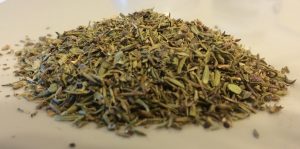 Thyme, also known as Thymus vulgaris, is a spice that is commonly used for culinary purposes. Considered more of a “Mediterranean” herb, this spice can be beneficial for more than just your cooking purposes.
Thyme, also known as Thymus vulgaris, is a spice that is commonly used for culinary purposes. Considered more of a “Mediterranean” herb, this spice can be beneficial for more than just your cooking purposes.
Uses:
When used in cooking, this herb can actually increase the “life expectancy” of your left overs because of its potent effect at fighting off bacteria. This herb is able to fight off infections through its ability to kill bacteria, viruses, parasites, and fungus. For this reason, thyme can be beneficial for colds, coughs, bronchitis, and even bad breath. In addition, thyme can be quite beneficial for digestive health. This herb can increase the amount of acid in the stomach – which may aggravate some forms of GERD or acid reflux, but can also help with some forms of GERD or acid reflux. This can result in thyme’s benefit towards gas, bloating, colic, and IBS. Thyme should be used in moderation in pregnancy due to some sources suggesting that it can a “mild uterine stimulant”. However, in normal amounts found in foods, thyme consumption is considered relatively safe in pregnancy.
Actions:
From these many different potential uses for time, it may be obvious what the actions of this spice are, but it includes:
Expectorant – helps you to cough up phlegm. I like to remind patients that sometimes this herb makes things worse before it makes things better because it can trigger a cough
Anti – tussive – helps to alleviate coughing
Anti – spasmodic – helps to decrease muscle spasms
Anti – microbial – helps to fight off infections
Carminative – aids with digesting and breaking down food
Anti – inflammatory – fights off inflammation
Anti – oxidant – defends against oxidative damage
Why Dr. Elisha Cook ND might prescribe Thymus vulgaris as a tea
I tend to prescribe this herb to individuals who have a cough or are fighting a respiratory infection. As per usual, I do like to prescribe teas for their therapeutic value as a tea and their medicinal value. I do not recommend consuming thyme as a tea outside the structured guidance of a naturopathic doctor or health care provider. Please seek medical advice before consuming Thyme.
Have you benefited from reading this blog? Know someone that would benefit as well? Share, Like, Comment, or Tweet this article, and let me know what you think.
Some of the information provided above may not be appropriate for everyone, please consult with your doctor before trying any of the above. If you are interested in Naturopathic Medicine and wanting a different approach to your health care needs, contact Dr. Elisha Cook ND by calling 519-537-7058 and book your appointment today!

